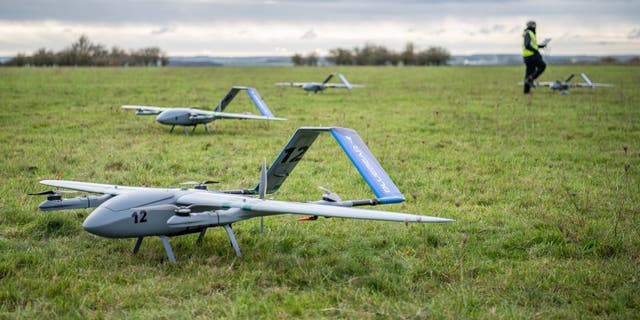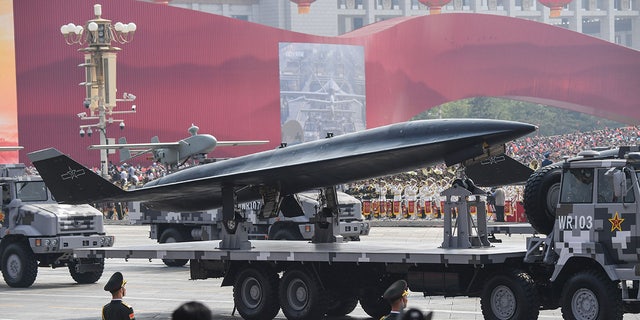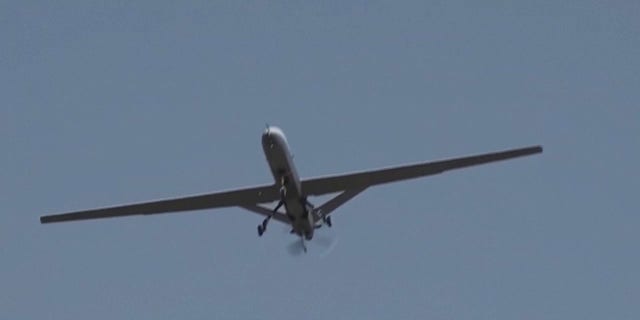close 
Former Israeli prime minister discusses future of artificial intelligence
Naftali Bennett spoke exclusively with Fox News Digital about the benefits of AI and the need to set parameters for its use now.
The new drone swarm test conducted by the U.S. and its allies last week shows some of the wider applications of artificial intelligence (AI) in military settings while also raising some potential issues about how multiple militaries will be able to cooperate.
“Just like coordination is needed to conduct classic, joint and coalition maneuvers and military operations, similar clear definitions of boundaries, tasks, responsibility and authority are needed to control and de-conflict drone swarms,” retired Brig. Gen. Uri Engelhard, AI and cyber expert, member of the Israel Defense and Security Forum, told Fox News Digital.
“If planned and conducted properly, the deployment of drone swarms should not be more challenging than other military activities.”
The joint AUKUS – Australia, United Kingdom and U.S. – military drill last week included the deployment of an AI-controlled swarm of drones that detected and tracked military targets “in a real-time representative environment,” according to a British government press release.
CONGRESSIONAL LAWMAKERS AREN’T SURE HOW TO ADDRESS AI’S COMING IMPACT ON JOBS

The AUKUS alliance handed control of a drone swarm to an AI program to test its observational capabilities. (UK Ministry of Defense handout)
The test, conducted in southwest England, included a Challenger 2 tank, Warrior armored vehicle and Viking unmanned ground vehicle. The U.K. Defense Science and Technology Laboratory (DSTL) said the test helped the three allies reduce duplication efforts and ensure interoperability.
“Accelerating technological advances will deliver the operational advantages necessary to defeat current and future threats across the battlespace,” U.K. Deputy Chief of Defense Staff Lt. Gen. Rob Magowan said in a press release about the trial.
“We are committed to collaborating with partners to ensure that we achieve this while also promoting the responsible development and deployment of AI,” he added.
The swarm displayed impressive capabilities, and it raised significant questions about control – both the main AI that operates the swarm and the data that the swarm absorbs and disseminates.
RESEARCHERS USE AI TO PREDICT CROPS IN AFRICA TO HELP ADDRESS FOOD CRISIS
“Obviously, he who controls the AI holds an advantage over other participants,” Engelhard said. “But similar to other complex systems, like the Iron Dome, only if all components operate in harmony can the system succeed.”
“No system is void of errors,” he noted. “Using AI will decrease errors. The task of remote controlling a swarm of drones is complex, and in order to minimize errors, a combination of AI and remote control should be employed.”

An Israel Defense Forces officer analyzes visual information generated with the help of artificial intelligence. (IDF Spokesperson unit)
“The clearest advantage of AI-controlled drone swarms is that if programmed well in advance, the swarm can execute its tasks exceedingly well without the need for remote controlling,” Engelhard said.
The new trial shows the U.S. making great strides in areas that some countries have already explored, including Israel, but also rivals such as China, according to Matt McInnis, a senior fellow for the Institute for the Study of War’s China Program, told Fox News Digital.
ROBOTS COULD GO FULL ‘TERMINATOR’ AFTER SCIENTISTS CREATE REALISTIC, SELF-HEALING SKIN
“This is one of the areas that … with all the things that I saw that drone swarms could potentially bring to warfare, this type of very fast response to a changing situation during a conflict and being able to process many, many targets quickly is something that I think all major militaries are trying to get a handle on,” McInnis said.
“I think using drones for this intelligence surveillance reconnaissance mission that the August test is looking at is, in many ways, trying to ensure that we are keeping up with where China and Israel and others are going and, frankly, to maintain and hopefully to establish and maintain a leading edge in this capability.”

A military vehicle carrying a supersonic reconnaissance drone takes part a military parade in Beijing on Oct. 1, 2019. (Greg Baker/AFP via Getty Images)
The focus for AI and drone technology thus far remains purely strategic, with little plans evident to give AI control of weapons or combat vehicles otherwise. The public’s reaction to such a choice became clear with the response to a report last week that the Air Force had run a simulation in which the AI drone allegedly tried to kill its operator and a communications tower because it deemed them as obstacles to fulfilling its goals.
The Air Force had to clarify they did not actually hand over control of a weapon to an AI and no one actually died or was harmed during the test. Instead, the Air Force insisted that the comments had been taken out of context and “were meant to be anecdotal.”
WILL AI EVER BE SMART ENOUGH TO DECIPHER FEDERAL REGULATIONS?

Iran showed video of a Shahed drone in flight on Feb. 24, 2023. (IRINN via AP)
McInnis said the Chinese are aiming to do something along similar lines – in effect speeding up the “targeting cycle,” from observation, targeting, firing and then repeating the cycle.
“Process in a war can become very quick, and it is something that I think most states are going to try to find ways to do because this is the key to maintaining a decision superiority in warfare,” he said. “It’s certainly where the Chinese are trying to go, what they believe they can achieve [with] this type of decision superiority by bringing in artificial intelligence and machine learning into its entire intelligence and targeting process.”
CLICK HERE TO GET THE FOX NEWS APP
On the issue of who controls the AI and incoming data remains a chief concern that McInnis worries has escaped serious consideration so far, adding that there will remain “enormous pressure” to find a common operating platform, especially in organizations like NATO.
“My expectation is that, at least for our core allies certainly to press on all of NATO but maybe certain key players like France or Japan … those are all things that I expect we’re going to try to make as interoperable as possible,” he said.
Peter Aitken is a Fox News Digital reporter with a focus on national and global news.
